Portable air conditioners are a popular choice for cooling homes, apartments, and offices, but many people wonder if they come with a downside – a higher energy bill. In this article, we will address this common concern and provide you with all the information you need to make an informed decision. Whether you’re considering investing in a portable air conditioner or already have one, we will explore the impact it may have on your energy bill and provide some tips on how to minimize any potential increase. So, sit back, relax, and let’s tackle the question: “Will a portable air conditioner increase my energy bill?”
Understanding the Energy Consumption of Portable Air Conditioners
Portable air conditioners are a popular choice for individuals looking to cool specific areas in their homes, apartments, or offices. However, it is essential to understand the factors that affect energy consumption when using these units. By understanding the energy consumption of portable air conditioners, you can make informed decisions to balance comfort and energy efficiency.
Factors Affecting Energy Consumption
Several factors contribute to the energy consumption of portable air conditioners. These factors include the unit’s BTU rating, the Seasonal Energy Efficiency Ratio (SEER), and the Energy Efficiency Ratio (EER).
Understanding BTUs
BTU, or British Thermal Units, is a measurement used to quantify the cooling capacity of air conditioners. The higher the BTU rating, the more cooling power the unit has. However, a higher BTU rating also means higher energy consumption. It is crucial to select a portable air conditioner with an appropriate BTU level for the space you intend to cool to avoid unnecessary energy waste.
Seasonal Energy Efficiency Ratio (SEER)
The Seasonal Energy Efficiency Ratio (SEER) measures an air conditioner’s cooling output over a cooling season divided by its electrical input. A higher SEER rating signifies a more energy-efficient unit. When choosing a portable air conditioner, look for a high SEER rating to ensure optimal energy efficiency and minimize energy consumption.
Energy Efficiency Ratio (EER)
The Energy Efficiency Ratio (EER) is similar to SEER but represents the cooling output of an air conditioner over a specific operating condition divided by its electrical input. A higher EER rating indicates a more energy-efficient unit. By selecting a portable air conditioner with a high EER rating, you can effectively minimize energy consumption and reduce your energy bills.
Comparing Energy Efficiency Ratings
To make an informed decision about the energy consumption of portable air conditioners, it is crucial to compare their energy efficiency ratings. Look for units that have Energy Star certification, as this indicates that they meet strict energy efficiency guidelines. By choosing an energy-efficient portable air conditioner, you can enjoy the benefits of cooling while minimizing your environmental impact and reducing energy costs.
Calculating the Potential Impact on Energy Bills
Before investing in a portable air conditioner, it is essential to calculate its potential impact on your energy bills. By considering factors such as power consumption, usage hours, and cost per kilowatt-hour, you can estimate the energy consumption of the unit and the associated increase in energy costs.
Determining Power Consumption
To determine the power consumption of a portable air conditioner, refer to the manufacturer’s specifications or product label. The power consumption is typically measured in watts and can vary based on the unit’s BTU rating and energy efficiency rating. By understanding the power consumption of the unit, you can have a clearer idea of its potential energy usage.
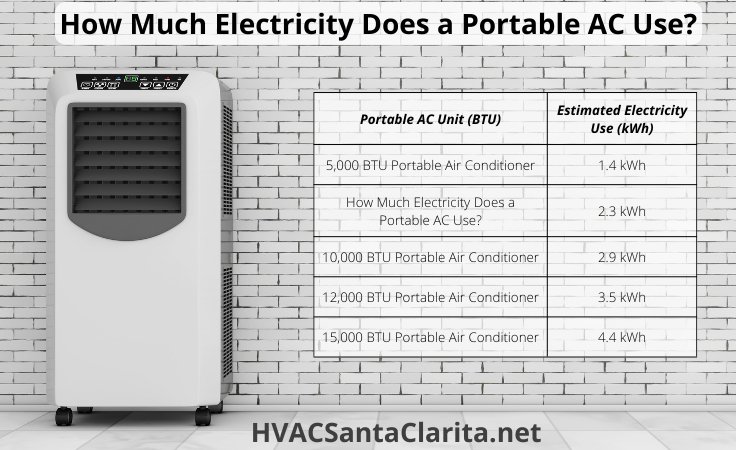
This image is property of hvacsantaclarita.net.
Usage Hours
Consider the number of hours you plan to use the portable air conditioner each day. The more hours the unit operates, the higher the energy consumption and the potential increase in energy costs. It is important to strike a balance between comfort and energy efficiency by using the unit only when necessary and optimizing other cooling strategies during periods of lower heat.
Cost per Kilowatt-hour
To estimate the increase in energy costs, you need to know the cost per kilowatt-hour (kWh) of electricity in your area. This information can typically be found on your utility bill or by contacting your electricity provider. By multiplying the power consumption of the portable air conditioner by the usage hours and the cost per kWh, you can estimate the additional cost of using the unit.
Estimating Energy Consumption
Using the power consumption, usage hours, and cost per kWh, you can estimate the energy consumption of the portable air conditioner. By accurately estimating energy consumption, you can make informed decisions about the unit’s impact on your energy bills and identify potential strategies to reduce energy usage.
Potential Energy Cost Increase
By calculating the estimated energy consumption and the associated cost increase, you can evaluate whether the benefits of using a portable air conditioner outweigh the potential increase in energy bills. It is crucial to consider your budget, comfort needs, and environmental impact when making this assessment.
Choosing an Energy-Efficient Portable Air Conditioner
By selecting an energy-efficient portable air conditioner, you can enjoy the benefits of cooling while minimizing energy consumption. Consider the following factors when choosing an energy-efficient unit:
Look for Energy Star Certification
Units with Energy Star certification meet strict energy efficiency guidelines set by the Environmental Protection Agency (EPA). Choosing an Energy Star certified portable air conditioner ensures that you are investing in a unit that is designed to reduce energy waste and lower your energy bills.
Selecting the Appropriate BTU Level
Choosing the appropriate BTU level for your portable air conditioner is crucial to avoid unnecessary energy consumption. An undersized unit may struggle to cool the space adequately, leading to longer operating times and increased energy usage. Conversely, an oversized unit may cycle on and off frequently, resulting in energy wastage. Ensure that you select a BTU level that matches the cooling needs of your space.
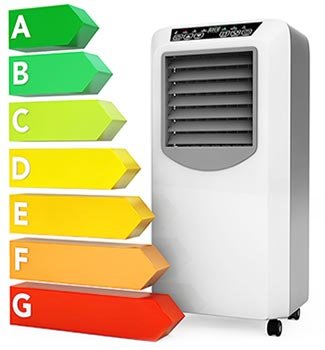
This image is property of homeownerfaqs.com.
Optimal Thermostat Settings
Properly setting the thermostat on your portable air conditioner can help optimize energy efficiency. Set the temperature to the highest comfortable level and consider using a programmable thermostat to schedule cooling during specific times when you need it most. By avoiding excessively low temperatures, you can reduce energy consumption while still enjoying a comfortable indoor environment.
Utilizing Energy-Saving Features
Many portable air conditioners come with energy-saving features such as sleep mode, timer functions, and fan-only mode. These features can help reduce energy consumption by adjusting the unit’s operation based on your preferences and the cooling needs of the space. Take advantage of these energy-saving features to further enhance the energy efficiency of your portable air conditioner.
Alternative Solutions to Reduce Energy Consumption
While portable air conditioners provide effective cooling, there are alternative solutions that can help further reduce energy consumption. By implementing these strategies in conjunction with your portable air conditioner, you can achieve optimal energy efficiency and minimize your environmental impact.
Proper Insulation and Weatherization
Proper insulation and weatherization play a vital role in reducing the energy consumption of any cooling system, including portable air conditioners. Ensure that your home or office is well-insulated, with weatherstripping around windows and doors to prevent hot air from entering and cool air from escaping. By reducing air leakage, you can optimize the efficiency of your portable air conditioner and minimize energy waste.
Using Fans in Conjunction with Portable AC
Using fans in conjunction with your portable air conditioner can help improve air circulation and enhance cooling efficiency. Ceiling fans or portable fans can be used to distribute the cooled air more effectively throughout the space. By relying on both the portable air conditioner and fans, you can maintain comfortable temperatures while reducing the reliance on the air conditioner alone.
Implementing Zone Cooling
If you have multiple areas to cool, consider implementing zone cooling. This involves using multiple portable air conditioners strategically placed in specific zones or rooms instead of cooling the entire space. By selectively cooling only the areas you need, you can reduce energy consumption while still enjoying comfortable temperatures.
Optimizing Ventilation
Proper ventilation is essential for cooling efficiency. Ensure that the portable air conditioner is vented correctly to expel hot air outside and bring in fresh air. Consider utilizing natural ventilation by opening windows during cooler periods or at night to take advantage of lower outdoor temperatures. This can further reduce the reliance on the portable air conditioner and minimize energy consumption.
Effective Tips to Manage Energy Consumption
To manage energy consumption effectively and optimize the use of your portable air conditioner, consider implementing the following tips:
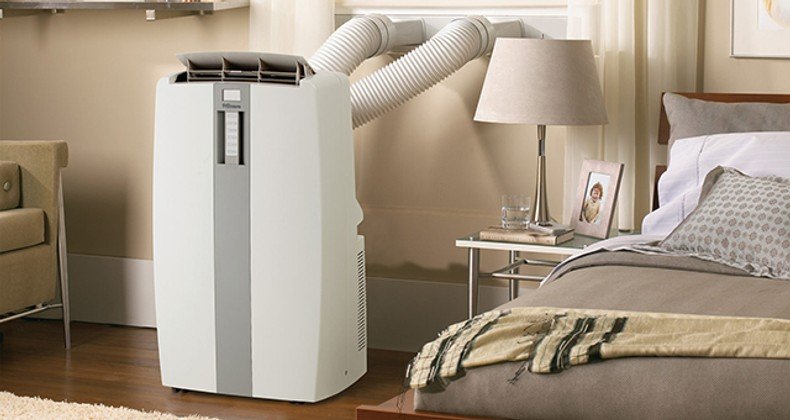
This image is property of s3-assets.sylvane.com.
Utilize Timers and Programmable Thermostats
Take advantage of the timer and programmable thermostat features on your portable air conditioner. By scheduling cooling periods during times when you need it most, such as when you are at home or during the hottest parts of the day, you can avoid unnecessary energy consumption. Set the thermostat to higher temperatures when you are away or asleep to further reduce energy usage.
Maintain Regular Maintenance and Cleaning
Proper maintenance and cleaning of your portable air conditioner are essential for optimal energy efficiency. Regularly clean or replace the air filters to ensure proper airflow and cooling performance. Clean the unit’s condenser coils to remove any dirt or debris that may hinder its efficiency. By keeping your portable air conditioner well-maintained, you can minimize energy waste and extend its lifespan.
Consider Room Size and Placement
When using a portable air conditioner, consider the size of the room or area you intend to cool. Placing a unit that is too small for the space may result in inadequate cooling, leading to longer operating times and increased energy consumption. Conversely, placing an oversized unit in a small area may cycle on and off frequently, wasting energy. Ensure that you select the appropriate unit size for the room and position it in a location that allows for optimal airflow and cooling performance.
Avoid Oversizing the Unit
It may be tempting to choose a larger, more powerful portable air conditioner with the belief that it will cool the space faster or more efficiently. However, oversizing the unit can lead to energy wastage. The unit may cycle on and off frequently, reducing its energy efficiency and increasing wear and tear. Consult the manufacturer’s recommendations or seek professional guidance to select the right-sized unit for your cooling needs.
Utilize Natural Cooling Methods
In addition to using your portable air conditioner, take advantage of natural cooling methods. Open windows in the evening or early morning to let in cooler air. Use ceiling fans or portable fans to enhance air circulation. Consider using blinds, curtains, or shades to block out sunlight and prevent heat gain. By combining these natural cooling methods with the use of your portable air conditioner, you can reduce energy consumption and still maintain a comfortable indoor environment.
Benefits of a Portable AC’s Portability
One significant advantage of portable air conditioners is their portability. This feature offers several benefits that make them a practical cooling solution for various situations and environments.
Flexibility for Cooling Specific Areas
Portable air conditioners provide the flexibility to cool specific areas without the need for complex ductwork or costly installations. Whether you need to cool a bedroom, home office, or specific living area, portable units offer targeted cooling where you need it most. This flexibility allows you to prioritize cooling in high-use areas while minimizing energy waste in unoccupied spaces.
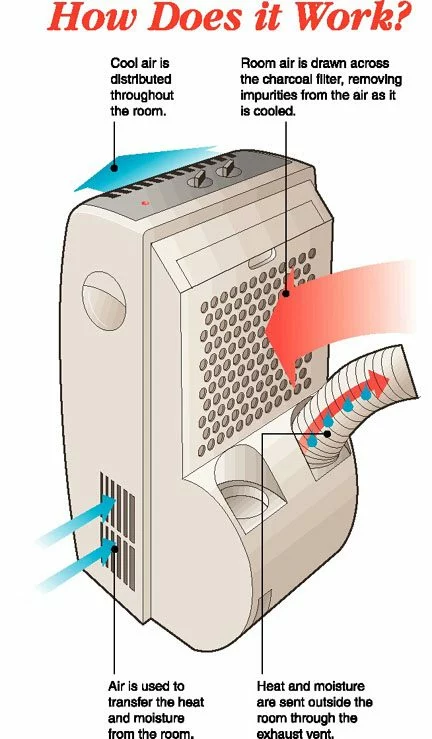
This image is property of www.irrgang.dev.
Portability and Easy Installation
As the name suggests, portable air conditioners are designed for easy mobility and installation. Most units come with wheels or casters, making it effortless to move them from one room to another as needed. Installation typically involves a vent hose to expel hot air outside and a window kit to seal the opening. With no permanent fixtures or modifications required, portable air conditioners are an attractive option for individuals who prefer easy installation and flexibility.
Convenience for Renters or Temporarily Staying
Renters or individuals living in temporary housing situations often face restrictions when it comes to modifying their living spaces. Portable air conditioners offer a convenient cooling solution without the need for permanent installations. As long as there is access to a window for venting, portable air conditioners can provide comfort and relief from hot weather without violating rental agreements or causing damage to the property.
Enhanced Comfort and Productivity
Portable air conditioners provide immediate cooling relief, allowing individuals to create comfortable indoor environments. Whether you are working, studying, or simply relaxing, a portable air conditioner can help maintain a cool and comfortable space, enhancing productivity and overall well-being. By having control over your immediate surroundings, you can optimize conditions for better focus, relaxation, and overall comfort.
Comparing Energy Consumption to Other Air Conditioning Options
When evaluating the energy consumption of portable air conditioners, it is essential to compare them to other common air conditioning options. Understanding how portable air conditioners stack up against central air conditioning systems, window air conditioners, ductless mini-split systems, and evaporative coolers can help you make an informed decision about the most suitable cooling solution for your needs.
Central Air Conditioning Systems
Central air conditioning systems are a common choice for cooling entire homes or large spaces. While these systems offer excellent cooling capacity, they often consume more energy due to their complexity and the need to cool the entire space continuously. Portable air conditioners, on the other hand, provide targeted cooling, allowing for better control over energy consumption and cost. If you only need to cool specific areas or have limitations that prevent the installation of a central air conditioning system, a portable unit may be a more energy-efficient alternative.
Window Air Conditioners
Window air conditioners are a popular choice for cooling individual rooms or small spaces. Similar to portable air conditioners, they provide localized cooling and are relatively easy to install. However, window air conditioners may be less energy-efficient compared to portable units due to possible air leakage through the window opening. Additionally, removing and reinstalling window units each year can lead to increased energy waste. Portable air conditioners, with their versatility and ease of installation, offer a compelling alternative that can provide equivalent cooling with potentially better energy efficiency.
Ductless Mini-Split Systems
Ductless mini-split systems consist of an outdoor unit and one or more indoor units connected by refrigerant lines. These systems offer zoned cooling, allowing for greater control over energy consumption. While ductless mini-splits can be highly efficient, their installation can be more involved and costly compared to portable air conditioners. Portable units provide a convenient and cost-effective solution when zoned cooling is desired without the need for extensive installation or modifications.
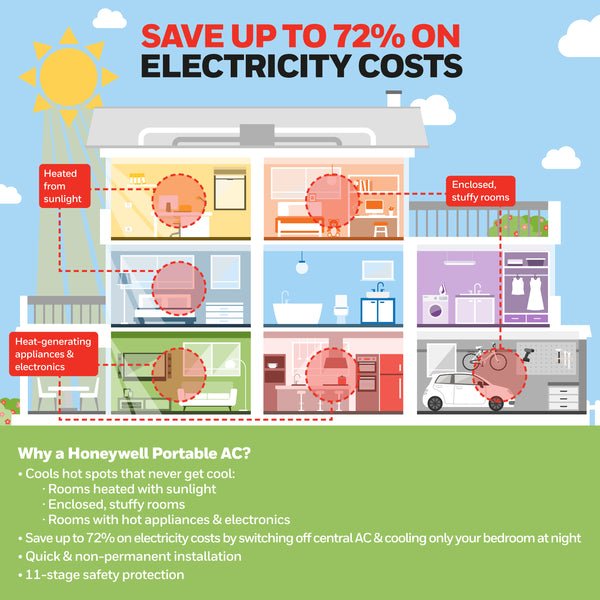
This image is property of cdn.shopify.com.
Evaporative Coolers
Evaporative coolers, also known as swamp coolers, use the evaporation of water to cool the air. These cooling systems are most effective in dry climates and can achieve significant energy savings compared to traditional air conditioners. However, their effectiveness diminishes in humid environments, rendering them less efficient. In comparison, portable air conditioners can provide reliable cooling regardless of humidity levels, making them a versatile and energy-efficient choice for various climates.
Evaluating the Long-Term Cost-Benefit of Portable Air Conditioners
When considering the long-term cost-benefit of portable air conditioners, several factors come into play. While the initial investment may be lower compared to other cooling options, it is essential to evaluate factors such as expected lifespan, durability, flexibility for future use, and overall energy efficiency.
Consideration of Initial Investment
Portable air conditioners generally have a lower initial investment compared to central air conditioning systems or ductless mini-split systems. This makes them an attractive option for individuals with budget constraints or those looking for a cost-effective cooling solution. While the initial upfront cost may be lower, it is important to consider other factors to determine the overall cost-benefit over time.
Expected Lifespan and Durability
The expected lifespan and durability of the portable air conditioner are important factors to consider when assessing its long-term cost-benefit. While specific models and brands may vary, portable units typically have a lifespan of 8-10 years with proper maintenance and care. Ensuring regular cleaning, filter replacement, and periodic maintenance can help extend the unit’s lifespan and optimize its energy efficiency.
Flexibility for Future Use
One of the significant advantages of portable air conditioners is their flexibility for future use. If you plan to move or relocate, portable units can be easily transported to your new location, providing continued cooling without the need for additional installations or modifications. This flexibility can save you money on future expenses and give you peace of mind knowing that your investment can be carried forward to your next living space.
Overall Energy Efficiency
To assess the long-term cost-benefit, it is crucial to evaluate the overall energy efficiency of the portable air conditioner. Look for units with high SEER and EER ratings, as they indicate greater energy efficiency and reduced energy consumption. By selecting an energy-efficient unit, you can reduce your energy bills and minimize the environmental impact while enjoying reliable and comfortable cooling.
Sustainable Cooling Practices to Reduce Energy Usage
Beyond the specific features and considerations of portable air conditioners, there are sustainable cooling practices that can help further reduce energy usage. By implementing these practices, you can achieve optimal energy efficiency while minimizing your environmental impact.
Using Natural Ventilation and Cross-Breezes
Take advantage of natural ventilation and cross-breezes to cool your space without relying solely on your portable air conditioner. Open windows and doors to let in fresh air during cooler periods or at night. Create cross-breezes by strategically positioning fans or utilizing natural airflows. By incorporating natural ventilation, you can reduce the need for constant air conditioning and minimize energy consumption.
Implementing Passive Cooling Strategies
Passive cooling strategies can significantly reduce energy usage by utilizing design principles to optimize natural elements. These strategies include shading windows with blinds or curtains to block out direct sunlight, using reflective roofing materials to minimize heat absorption, and incorporating proper insulation and ventilation to maintain comfortable indoor temperatures. By implementing passive cooling strategies, you can minimize the reliance on powered cooling systems and effectively reduce energy usage.
Home Energy Audits and Efficiency Upgrades
Consider conducting a home energy audit to identify areas where energy efficiency can be improved. Energy audits can pinpoint areas of excessive energy consumption, such as air leaks, inadequate insulation, or outdated appliances. By making efficiency upgrades based on the audit’s findings, such as sealing air leaks, adding insulation, or replacing outdated equipment, you can optimize your home’s energy efficiency and reduce overall energy consumption.
Considering Solar-Powered Portable AC Units
For individuals seeking a sustainable cooling solution, solar-powered portable air conditioners are worth considering. These units utilize solar panels to convert sunlight into electricity, reducing reliance on the electrical grid and minimizing energy consumption. While the initial investment for solar-powered units may be higher than standard portable air conditioners, the long-term cost savings and environmental benefits can make them an attractive option for sustainable cooling.
Final Verdict: Balancing Comfort and Energy Efficiency
In the final verdict, it is essential to strike a balance between comfort and energy efficiency when choosing a portable air conditioner. By considering the pros and cons, making informed decisions based on personal comfort needs, and seeking professional guidance when needed, you can achieve optimal cooling while minimizing energy consumption.
Weighing the Pros and Cons
Portable air conditioners offer several advantages, including mobility, easy installation, and targeted cooling. They provide a practical solution for individuals who require cooling in specific areas without incurring significant costs or making permanent modifications. However, it is important to weigh these benefits against potential disadvantages such as higher energy consumption compared to other cooling options and the unit‘s limited cooling capacity.
Making an Informed Decision
To make an informed decision about using a portable air conditioner, consider your specific cooling needs, the space you intend to cool, and your budget. Evaluate factors such as energy efficiency ratings, estimated energy consumption, and potential increase in energy costs. By considering these factors, you can determine whether the benefits of using a portable air conditioner outweigh the associated energy usage and costs.
Considering Personal Comfort Needs
Your personal comfort needs are an essential consideration when choosing a cooling solution. While energy efficiency is crucial, it is equally important to ensure comfort and well-being in your living or working environment. Portable air conditioners provide immediate relief from hot temperatures, allowing you to create a comfortable indoor space tailored to your preferences. By prioritizing personal comfort needs while considering energy efficiency, you can strike a balance that works best for you.
Seeking Professional Guidance
If you are uncertain about the most suitable cooling solution for your needs or require assistance in evaluating the energy efficiency of portable air conditioners, consider seeking professional guidance. HVAC professionals can provide expert advice, help with sizing calculations, and recommend the most energy-efficient options based on your specific requirements. Their expertise can ensure that you make an informed decision that maximizes both comfort and energy efficiency.
In conclusion, understanding the energy consumption of portable air conditioners is crucial for making informed decisions about cooling solutions in your home, apartment, or office. By considering factors such as BTUs, energy efficiency ratings, estimated energy consumption, and potential energy cost increase, you can evaluate the impact on your energy bills. Additionally, choosing an energy-efficient portable air conditioner, implementing alternative solutions to reduce energy consumption, and practicing effective energy management strategies can further optimize energy efficiency. By striking the right balance between comfort and energy efficiency, you can enjoy the benefits of portable air conditioners while minimizing your environmental impact and reducing energy costs.
